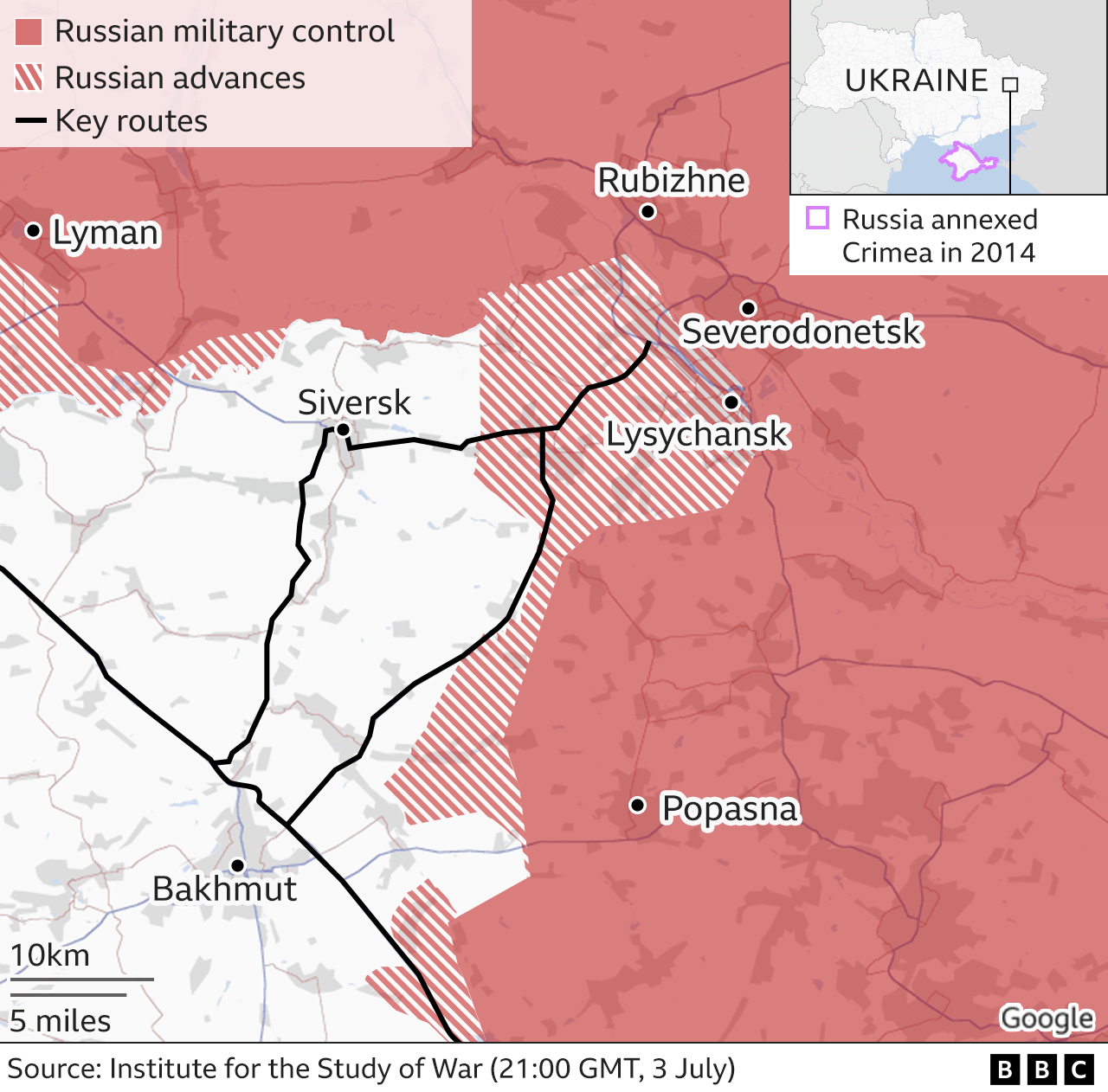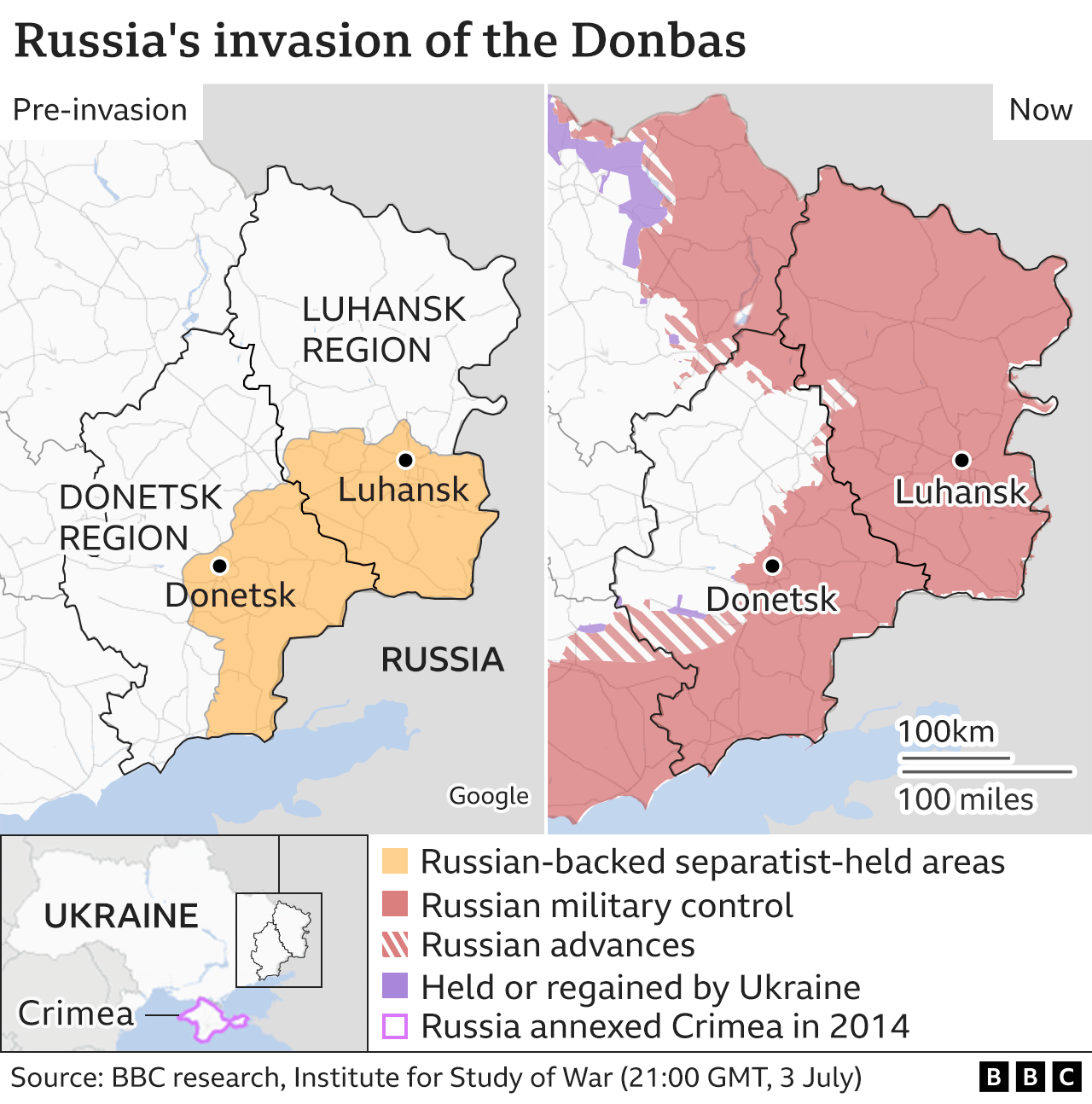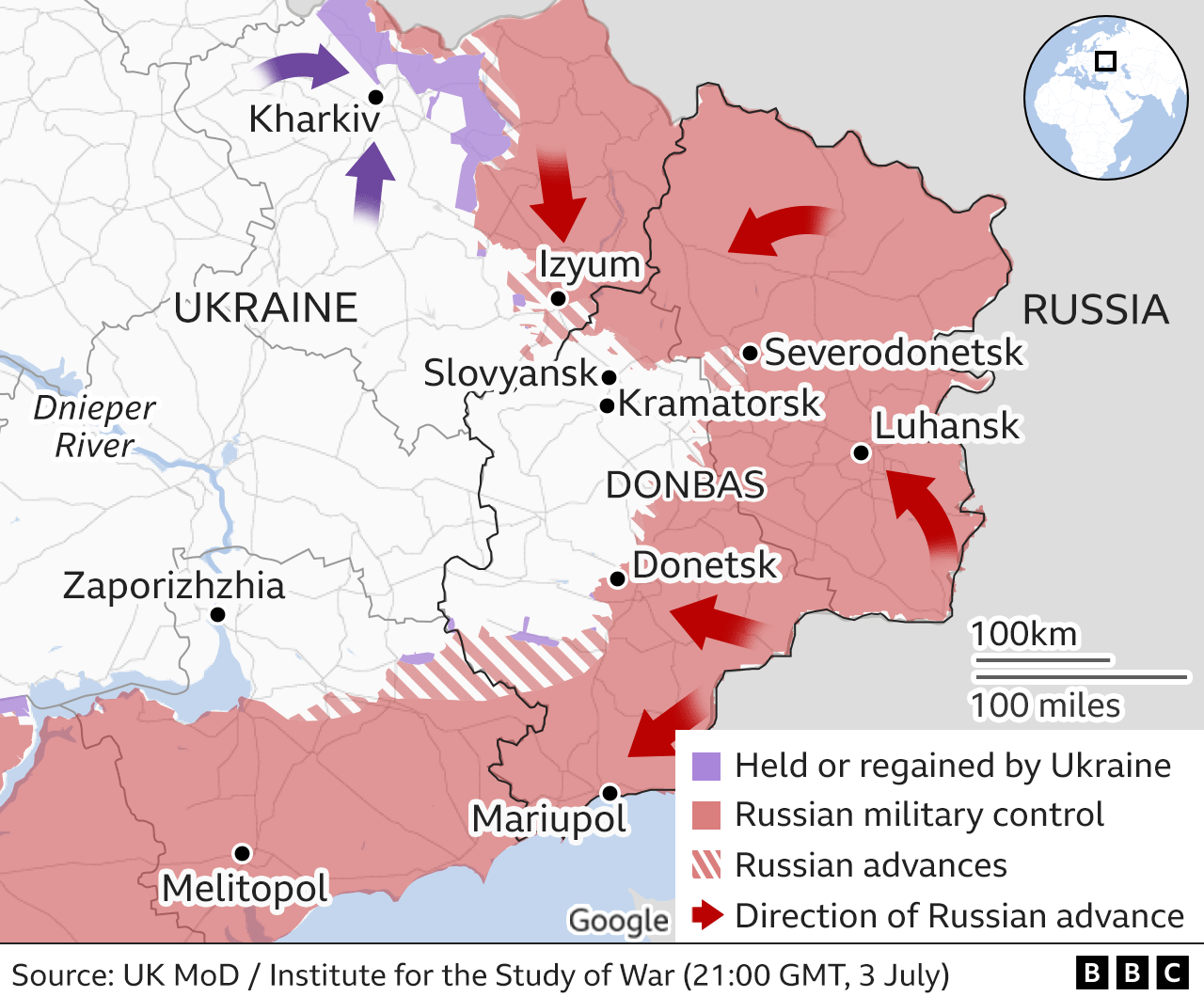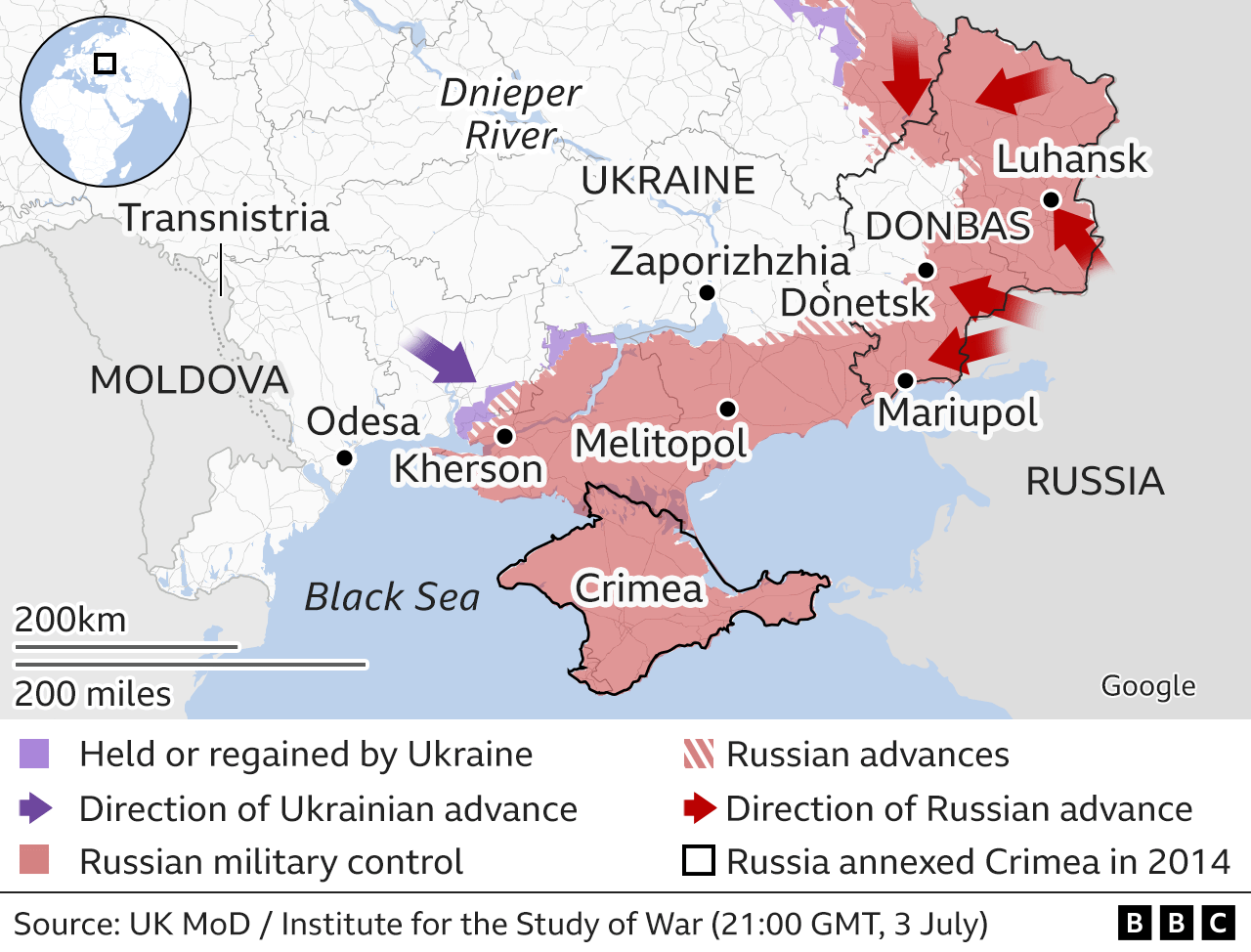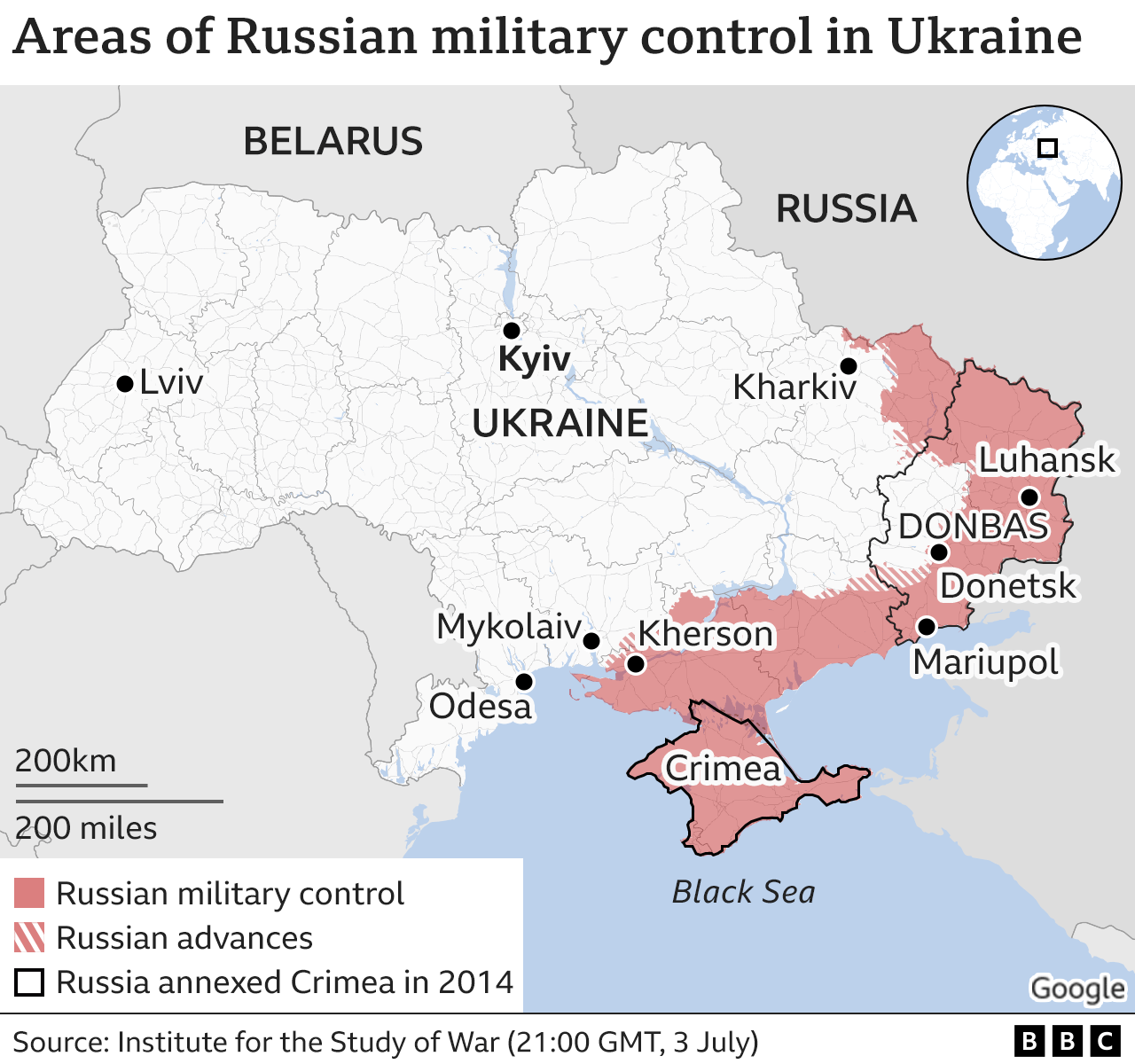War in Ukraine Live Updates Verified Videos Donbas Region Russian Combat Capabilities HIMARS Strike on Apartment Complex in Eastern Ukraine Kills 15, Traps More Under Rubble
Rescuers are searching for more than 24 people feared trapped under the rubble, officials said, after a missile struck residences in eastern Ukraine on July 10. (Video: Reuters)
The toll probably will rise, Ukrainian officials said, with more than 20 people believed to be trapped beneath the wreckage in the town of Chasiv Yar. Rescuers pulled six survivors from the debris pile, the most recent emerging after almost one full day of digging. “There are 15 names in the list of the dead and, unfortunately, this is not the final number,” Ukrainian President Volodymyr Zelensky said late Sunday, adding that the strike shows how Russia “kills absolutely deliberately.”
The attack occurred near the front line in Ukraine’s Donetsk province, one half of the Donbas region, and it underscored the intensifying fight for ground there after Russia captured nearly all of neighboring Luhansk. At the same time, Ukrainian authorities appear to be preparing for intense fighting in the south as they seek to recapture territory from Moscow. Deputy Prime Minister Iryna Vereshchuk urged residents of the Russian-held Kherson and Zaporizhzhia regions to evacuate, saying Ukrainian forces were set to “de-occupy” the area.
Here’s what else to know
The French government is bracing for Moscow to completely shut off gas shipments to Europe, a scenario it sees as the most likely outcome of the escalating feud between Russia and the West over sanctions and energy.
Speaking Sunday at the Rencontres Économiques, an economics forum in southern France, French Finance Minister Bruno Le Maire said it would be “totally irresponsible to ignore” the possibility that Russia cuts the flow of gas more than it already has.
“Let’s prepare for a total cutoff of Russian gas,” Le Maire said. “Today that is the most likely option.”
France relies on Russia for about a fifth of its gas supply, making it less dependent on Moscow than countries such as Germany and Italy, but virtually the entire European Union has said weaning itself off Russian gas should be a priority. Several member countries remain heavily reliant on Moscow, which has proved problematic in the months since Russia’s invasion of Ukraine touched off several rounds of sanctions. E.U. leaders have accused Russia of weaponizing energy in retaliation for sweeping restrictions.
At the economics forum, Le Maire said countries must encourage residents and businesses to curb gas consumption. French legislators next week will debate a bill that would give the national government broad power to restrict use.
During ‘operational pause,’ Russia launches rocket attacks
In the days since Moscow announced an operational pause in eastern Ukraine, Russian forces have nonetheless carried out missile strikes across the front lines, killing dozens as they seek to regroup and avoid ceding captured territory.
During the weekend alone, Ukrainian authorities reported about three dozen airstrikes, and one regional governor said Russia was raising “true hell” in the country’s east.
“In the past week, many talked about the alleged ‘operational pause’ in the actions of the occupiers in Donbas and other parts of Ukraine,” Ukrainian President Volodymyr Zelensky said in a Sunday evening address. “Thirty-four airstrikes by Russian aircraft over the past day is an answer to all those who came up with this ‘pause.’”
Analysts at the Washington-based Institute for the Study of War predicted the tactical adjustment last week, and Russia’s Defense Ministry appeared to confirm the assessment when it said troops were “taking measures to recover their combat capabilities.” However, the analysts cautioned, such a regrouping does not mean fighting will temporarily cease. On the contrary, they noted, Russia probably will carry out “limited offensive operations” to disguise its reorganization.
“Russian campaign design, inadequate as it has generally been, is nevertheless good enough to manifest this basic principle of operational art,” the institute reported.
Zelensky and other Ukrainian leaders have incorporated such assessments into their rhetorical rallying cries, arguing that there has been no pause, but increased aid could win one.
“The Ukrainian army is holding on firmly, repelling attacks in various directions,” he said. “But, of course, a lot still needs to be done so that Russian losses really cause such pause.”
Russia’s alternative to McDonald’s facing french-fry shortage
The recently opened Russian alternative to McDonald’s — which left the country in May over Russia’s war in Ukraine — is both a fast-food chain and a currency in Moscow’s propaganda campaigns.
In a shortage wrought with symbolism, Vkusno i Tochka, which translates as “Tasty and that’s it,” is limiting the sale of fries this summer because it is unable to source enough potatoes, the company told the Russian state news agency Tass on Friday.
The Russian franchise said it is running low on the menu’s country-style potatoes, its thicker-cut cousin of the Americanized french fry, because of supply chain disruptions caused in part by war and Western sanctions.
Ukraine criticizes Canada’s decision to return Russian gas turbine to Germany
The Ukrainian government on Sunday criticized Canada’s decision to return a sanctioned Russian gas turbine to Germany, a diplomatic deal that Kyiv said would embolden Moscow to “continue to use energy as a tool of hybrid warfare against Europe.”
The dispute revolves around a Canadian-built turbine that helps pump gas through the Nord Stream 1 pipeline, which runs from Russia to Germany. The equipment has been stranded in Montreal, where it underwent repairs, due to Canadian sanctions on Moscow, and Russia’s state-controlled gas company cited the turbine when it cut flows to Europe last month — a move Western nations called “energy blackmail.”
Canada skirted its own sanctions on Russia to return the turbine to Germany, which had been pushing for the return so it could stockpile gas before winter amid fears of energy rationing. But Ukrainian officials have argued that there is no technical basis for Russia’s demand that the turbine be exported, as the pipeline can operate without it. Moscow, they say, is choosing to weaponize gas flow in retaliation to sanctions.
“This dangerous precedent violates international solidarity, goes against the principle of the rule of law and will have only one consequence: it will strengthen Moscow’s sense of impunity,” Ukraine’s ministries of foreign affairs and energy said in a joint statement.
The ministries urged the Canadian government to reconsider its decision and “ensure the integrity of the sanctions regime.”
The dust-up put Canada in a delicate position, caught between two allies: Germany, a NATO partner, and Ukraine, which Ottawa has backed since Russia’s full-scale invasion began, penalizing more than 1,000 people and entities, including Russia’s oil and gas sector and its industrial manufacturing industry. Canada is also home to the world’s second-largest Ukrainian diaspora community.
Canada’s Conservative opposition party also criticized the decision, saying in a statement Sunday that “the return of the gas turbine sets a dangerous precedent of folding to Putin’s blackmail of Europe, and will negatively impact Canada’s standing on the world stage.”
Jonathan Wilkinson, Canada’s natural resources minister, said Saturday that the permit to return the turbine is “time-limited and revocable.”
“Absent a necessary supply of natural gas, the German economy will suffer very significant hardship,” he said, “and Germans themselves will be at risk of being unable to heat their homes as winter approaches.”
Family of American missing in Ukraine says U.S. response is inadequate
The family and friends of a U.S. military veteran who went missing in Ukraine have accused the Biden administration of inaction, saying any hope for finding him alive hinges on diplomacy between Washington and Moscow but that so far the government’s efforts are lacking.
Grady Kurpasi, 50, was last seen April 26 in southern Ukraine, where his team of international volunteers was engaged in combat with Russian forces. His loved ones fear he has been killed or captured — and they are mindful of the Kremlin’s recent declaration that Americans taken off the battlefield shall not be granted protections afforded to prisoners of war.
A U.S. official, speaking on the condition of anonymity to discuss internal deliberations, said the administration is closely monitoring the situation and seeking information for the family, but stopped short of saying what more the government may do. Neither the Russian Embassy in Washington nor the Ukrainian Defense Ministry responded to requests for comment.
The mystery surrounding Kurpasi’s whereabouts presents a unique dilemma for President Biden, who has rallied Western support for Ukraine while ruling out direct military intervention and strongly cautioning Americans against getting involved. At least two U.S. citizens are believed to have been killed in the fighting, and another two are known to be captured.
A Ukrainian priest splits Sundays between church and the front lines
KOSTIANTYNIVKA, Ukraine — Father Vitalii Kester’s Sunday routine is not what it used to be, before war drove most of his congregation away and he started wearing Army pants beneath his robes and splitting his day between one Mass at church and another with soldiers on the battlefields of eastern Ukraine.
But on this July Sunday, the sabbath started out as normally as life can be for a war-zone priest leading a front-line church. Kester, 46, greeted the trickle of parishioners coming for the 10 o’clock service at St. Mykolai the Miracle Worker, a log church topped with onion-shaped domes. The sound of artillery is nearly constant in this mostly abandoned city 11 miles from the nearest Russian troops.
“Glory to Jesus Christ,” he said to Igor Ryzenko, adding, “Do you have any fuel containers I can borrow?” because scrounging gasoline and water has also become normal here.
Russia blocks Germany’s Die Welt news site
Russia has blocked online access to Germany’s Die Welt newspaper, the latest such move in its clampdown on Western media reporting and information, Reuters reported Sunday.
Welt.de and all its subdomains are blocked, including the site bild.de, which shares Welt’s publisher, Axel Springer SE. Russian prosecutors requested the action on Saturday, Welt said in an online report published Sunday, citing open-source data from Russia’s internet censorship agency, Roskomnadzor.
“The official justification of the censorship board is vague,” Welt said. “But the critical coverage of the Russian war of aggression in Ukraine is probably a thorn in the side of the Kremlin.”
In recent months, Russia has cut off access to the BBC, Voice of America, Deutsche Welle, Radio Free Europe/Radio Liberty and others, along with Facebook and Instagram.
Moscow’s block of the BBC in early March led the news organization to release a list of circumvention tools to the public — advice provided in English, Russian and Ukrainian.
Russia has characterized coverage of its Ukraine invasion as “false information,” and President Vladimir Putin introduced a law that criminalized news reports that referred to the war, prompting many Western news outlets to adjust their operations in the country. Many said they would slow activity in Russia, and some journalists fled the country. Those found guilty of writing what the Kremlin considers to be fake news could face a 15-year prison sentence.
Press freedom groups condemned the moves. “The Russian public cannot be deprived of information and news and be forced to rely on the Kremlin-approved interpretation of events at this very important time in Russian history,” the Committee to Protect Journalists said in March of Putin’s new law. “The censorship must stop, and bans must be lifted.”
Russia has not managed to advance farther in Luhansk, governor says
Russian troops have not managed to advance in Luhansk over the past 24 hours, regional governor Serhiy Haidai said in an interview published to his Telegram channel on Sunday, adding that a “very small” piece of the devastated area was holding out against Russian forces.
Haidai said that Ukrainian defenders in the region were making a “powerful” impact on the Russian army and that, so far, further efforts to advance had been unsuccessful. On Sunday, Britain’s Defense Ministry said it was likely that Russian troops have made “further small territorial advances” around Popasna, a town on the western side of the eastern Luhansk region.
The Luhansk region is almost entirely under Russian control. When asked about the village of Bilohorivka, a holdout in the region, Haidai said it was difficult to tell how many civilians remain.
“We told everyone to take shelter as the amount of shelling was sufficiently strong and fighting is constantly underway there,” he said. “It is not at all possible to go there and transport people out.”
Haidai warned Friday that the city of Severodonetsk could soon face a “humanitarian disaster” after the withdrawal of Ukrainian troops late last month. Asked Sunday whether any utility services destroyed in the conflict were being restored, the governor said the recovery response would need “hundreds of billions of hryvnia” — the Ukrainian currency — and that rebuilding would take time.
“It can be said that the city faces a kind of communal collapse,” Haidai said, noting that water and heating services had been destroyed in Severodonetsk and Lysychansk. “It will simply be a catastrophe” with fall and winter on the horizon, he said.
Kharkiv is likely target for Russian annexation, analysts say
The Ukrainian province of Kharkiv is probably a target for annexation by Russia, according to analysts from the Institute for the Study of War, citing Russian authorities’ use of Russian Imperial imagery, the establishing of a civilian administration there and the declaration of the area as an “inalienable” part of Russia.
The analysts from the D.C. think tank said Russian occupiers in the Kharkiv region had used Russian Imperial imagery of a double-headed eagle on a new flag for the occupying regime there. They set up a civilian administration and introduced martial law in occupied parts of the region last week, the analysts said.
Kharkiv is in northern Ukraine, northwest of the Donetsk region that Russia has made clear it wants to capture. The signs point to Russia wanting to annex Kharkiv rather than create a “people’s republic” — indicating that “the Kremlin has broader territorial aims than capturing” just Donetsk, the analysts said in an assessment Saturday.
The Kharkiv region is home to the city of Kharkiv, which is Ukraine’s second-largest after the capital, Kyiv. The city of Kharkiv is not under Russian control, though Moscow has encroached on the eastern reaches of the region. “Significant fighting” has occurred in recent days north of the city, according to the institute, with the city of Kharkiv surrounded to the north and east by Ukrainian counteroffensives.
A hunt for the missing after Russian strike in Chasiv Yar
Rescuers are searching for more than 20 people believed buried under rubble after a Russian missile strike on a five-story building in the eastern Ukrainian city of Chasiv Yar on Saturday. By Sunday lunchtime, the confirmed death toll stood at 15, after what Ukrainian presidential adviser Andriy Yermak called “another terrorist attack by the terrorist country.”
Russia accused of purposely destroying crops
Police in the southern Ukrainian city of Kherson said they had opened criminal proceedings against Russia over accusations that Russian forces “continue to purposefully destroy crops.”
“Large-scale fires occur every day,” the police said in a Facebook post. “Hundreds of hectares of wheat, barley and other grain crops have already burned,” the police added. One hectare is about 2.5 acres.
The fires threaten to further stoke tensions over global food supplies, with Russia accused of blocking tons of grain from being sent out of Ukraine. Ukrainian Foreign Minister Dmytro Kuleba accused Moscow on Friday of playing “hunger games” with the world’s food supply over its blockades in the Black Sea.
Russia likely to have made more small advances near Popasna, U.K. says
It is likely that Russian troops have made “further small territorial advances” around Popasna, a town on the western side of the eastern Luhansk region, Britain’s Defense Ministry said Sunday in its latest intelligence update.
As Russia attempts to make gains and push through the Donetsk region, the E40 highway that links it with Kharkiv “is likely to be an important objective,” it said.
Russian forces continue to strike a broad range of targets, including Izyum, Lysychansk and the Donbas region, which shares a border with Russia and has served as a flash point during the war in Ukraine, the ministry said.
Chasiv Yar strike kills 15, leaves dozens under rubble, officials say
The death toll has risen to 15, as rescuers search rubble after a Russian missile hit a five-story building in the eastern Ukrainian city of Chasiv Yar.
Ukraine’s State Emergency Services said another 24 people are believed trapped under debris, as rescue efforts continue.
Five wounded people have so far been recovered, Donetsk regional governor Pavlo Kyrylenko tweeted earlier, adding that Russian missiles had struck the area Saturday evening.
Ukrainian presidential adviser Andriy Yermak condemned Russia for the attack, calling it “another terrorist attack by the terrorist country. Russia should be on the list of states that sponsor terrorism.”
Zelensky dismisses Ukrainian envoys, renews appeals for Western weapons
Ukrainian President Volodymyr Zelensky has dismissed more than a half-dozen of Kyiv’s foreign diplomats, including Andrij Melnyk, who has served as the country’s ambassador to Germany since 2014.
In a flurry of presidential decrees posted Saturday, Zelensky’s office also announced the dismissals of ambassadors to Bangladesh, the Czech Republic, Hungary, India, Maldives, Nepal, Norway and Sri Lanka. Zelensky addressed the series of decrees in his nightly address Saturday, saying the Ministry of Foreign Affairs is preparing new ambassador candidates.
“This rotation is a normal part of diplomatic practice,” he said.
Ukrainian diplomats around the world have echoed Kyiv’s calls for more weapons, ammunition and aid from allied countries since Russia’s Feb. 24 invasion. On Saturday night, Zelensky said Ukraine could only respond to Russian strikes in the east “with modern, high-precision and potent weapons.”
Reports had swirled in recent days that Melnyk’s dismissal in particular was imminent. As a long-serving envoy, Melnyk had fiercely defended his country’s interests abroad, but he also caused controversy for his blunt remarks and sometimes caustic public style. He clashed with Ukraine’s German allies and blasted Berlin for its “hesitant” response to Russia’s invasion of Ukraine.
“I don’t give a damn what they think. I’m not here for a beauty competition,” Melnyk told The Washington Post in an interview in June. “If anyone feels offended, I don’t really care. My only task is to tell people the truth of what is happening and this catastrophic situation in my country.”
Most recently, Melnyk gave remarks praising Stepan Bandera, the polarizing World War II-era Ukrainian nationalist leader responsible for ethnic cleansing campaigns against Polish and Jewish people. As Ukraine’s top envoy to Germany, Melnyk held his post for eight years, more than twice the typical tenure of most ambassadors.
Battleground updates: Slovyansk hit, evacuations urged in south
Slovyansk: Russian assaults northwest of Slovyansk, the new focal point of the battle for control of the eastern Donbas region, were unsuccessful in recent days, according to the Institute for the Study of War (ISW). Homes were hit in the city on Saturday, as well as in other parts of the Donetsk region, according to its governor, Pavlo Kyrylenko.
Chasiv Yar: At least 30 people were trapped in the rubble of a five-story building hit by Russian missiles in this city southeast of Slovyansk, Kyrylenko said Sunday. Six dead and five injured had so far been recovered, he said.
Kharkiv: Russian forces were attacking areas northwest of the city of Kharkiv, the ISW said, as Russian-aligned occupiers in the larger Kharkiv area have set conditions for an annexation of the region, it added.
Kherson and Zaporizhzhia regions: Ukrainian Deputy Prime Minister Iryna Vereshchuk has urged residents of these southern regions to evacuate immediately, ahead of planned efforts by Ukrainian forces to “de-occupy” the area. They should leave even if it means temporarily heading to Russia or annexed Crimea. “It will be a huge fight,” she said on television, according to local media.
Blinken questions China’s position on Russia
Secretary of State Antony Blinken on Saturday criticized China’s “alignment” with Russia amid the invasion of Ukraine, questioning how any country could remain neutral. His remarks followed a gathering of the world’s largest economies in Indonesia, where he held more than five hours of talks with Chinese Foreign Minister Wang Yi.
“What you hear from Beijing is that it claims to be neutral” on Ukraine, Blinken said after the Group of 20 summit. “I would start with the proposition that it’s pretty hard to be neutral when it comes to this aggression.”
He added that China was not neutral, but rather pro-Moscow: “It supported Russia in the U.N. It continues to do so. It amplified Russian propaganda,” he said.
“This really is a moment where we all have to stand up … to condemn the aggression, to demand, among [other] things, that Russia allow access to food that’s stuck in Ukraine because of its blockade, and of course, that it end the war,” he said.
Wang did not comment specifically about his discussion of Ukraine with Blinken, but “many people believe that the United States is suffering from an increasingly serious bout of ‘Chinaphobia,’” he said.
Blinken declined to meet with Russian Foreign Minister Sergei Lavrov at the G-20 gathering. “We see no signs whatsoever that Russia is prepared to engage in meaningful diplomacy,” Blinken told reporters.
At the summit, his message to Moscow was clear. “To our Russian colleagues: Ukraine is not your country. Its grain is not your grain. Why are you blocking the ports? You should let the grain out,” Blinken said, according to a Western diplomat in the room who spoke on the condition of anonymity to relate events at the session.
Canada to return sanctioned Russian gas turbine to Germany
TORONTO — Canada said Saturday that it will export a sanctioned Russian gas turbine back to Germany in a decision poised to upset Ukraine, which pressed Ottawa not to skirt the sanctions it has levied on Moscow.
The turbine, built in Canada by Germany’s Siemens Energy, helps pump gas through the Nord Stream 1 pipeline, which runs from Russia to Germany under the Baltic Sea.
The equipment was being repaired in Montreal when it became stranded because of restrictions that Canada imposed on Russian industry after the full-scale invasion of Ukraine. Gazprom, Russia’s state-controlled gas company, cited the missing turbine when it cut flows to Europe last month.
Jonathan Wilkinson, Canada’s natural resources minister, said in a statement Saturday that the country will grant a “time-limited and revocable” permit to Siemens Canada to return the repaired turbine to Germany.
“Absent a necessary supply of natural gas, the German economy will suffer very significant hardship,” he said, “and Germans themselves will be at risk of being unable to heat their homes as winter approaches.”
Debate over the turbine saw Canada caught between two allies: Germany, which pushed it to return the turbine so it could stockpile gas before winter amid fears of energy rationing, and Ukraine. Germany has also been looking to Canada as a potential energy source as it weans itself off Russian energy.
Canada is home to the world’s second-largest Ukrainian diaspora community.
Alexandra Chyczij, national president of the Ukrainian Canadian Congress, said she was “deeply disappointed” by Canada’s “decision to bow to Russian blackmail” and “energy terrorism.”
“In acceding to Germany’s request, Canada will not only contravene its policy of isolating Russia,” she said in a statement. “It will set a dangerous precedent that will lead to the weakening of the sanctions regime imposed on Russia.”
Canada has imposed sanctions on more than 1,150 Russians, Belarusians and Ukrainians since Russia invaded Ukraine in February. It said Saturday that it would expand existing sanctions on Russia’s oil and gas sector to industrial manufacturing, including land and pipeline transport.
Russian missiles strike several residential areas, Zelensky says
Russian missiles struck residential areas in Kharkiv, Mykolaiv and Dnipropetrovsk, killing and wounding civilians on Saturday, Ukrainian President Volodymyr Zelensky said in his nightly address.
The attacks were “fired precisely at the residential sector,” Zelensky said, including in his hometown Kryvyi Rih, which he visited Friday.
Kryvyi Rih Mayor Oleksandr Vilkul said on Facebook that a 20-year-old woman died in a hospital from injuries after a strike in the city.
Valentyn Reznichenko, the governor of Dnipropetrovsk, said on Telegram that the attack in Kryvyi Rih killed at least two people — including the 20-year-old woman — and injured three.
It is unclear the exact number of injuries and casualties in Mykolaiv, according to a Telegram message from Vitaliy Kim, the regional governor.
Zelensky said in his address Saturday that the Russian strikes can only be halted with “high-precision and potent” weapons, and he included his thanks to the United States for its $400 million military assistance package.
The package, which the Pentagon announced Friday, includes four high-mobility artillery rocket systems, also known as HIMARS. The United States has delivered eight HIMARS to Kyiv.
As war nears 5th month, Blinken keeps Russian diplomats at arm’s length
NUSA DUA, Indonesia — In the nearly five months since Russia invaded Ukraine, Secretary of State Antony Blinken has maintained the same posture toward Moscow: Do not engage.
The top U.S. diplomat has not held a single meeting or phone call with a senior Russian official throughout the conflict — a cold-shoulder strategy he continued over the weekend at a gathering of foreign ministers of the world’s 20 biggest economies in Indonesia, where his Russian counterpart, Sergei Lavrov, was sometimes in the same room with him.
“The problem is this,” Blinken told reporters at a news conference on Saturday. “We see no signs whatsoever that Russia is prepared to engage in meaningful diplomacy.”
Russia and Ukraine responsible for March nursing home attack, U.N. says
Russian-backed forces attacked the nursing home on March 11 while patients and staffers were inside. Days earlier, the nursing home’s management requested multiple times that authorities evacuate its residents, but Ukrainian forces had already mined and surrounded the area, according to the report from the Office of the U.N. High Commissioner for Human Rights (OHCHR) published June 29.
Ukrainian soldiers entered the care home March 7, the report said, because its location had “strategic value.” Two days later, they exchanged fire with approaching Russian forces, but the report said “it remains unclear which side opened fire first.”
During the second exchange on March 11, 71 patients and 15 staff members were inside the nursing home as the attack began, according to the report. A fire also broke out while fighting ensued.
Dozens were killed, but the exact number is still unknown, the report said. At least 22 patients survived.
The OHCHR said the nursing home attack was “emblematic” of its concerns that both Russian and Ukrainian armed forces were using “human shields.”
The office defines human shields as using civilians to “render certain points or areas immune from military operations,” which is prohibited by the Geneva Conventions.
